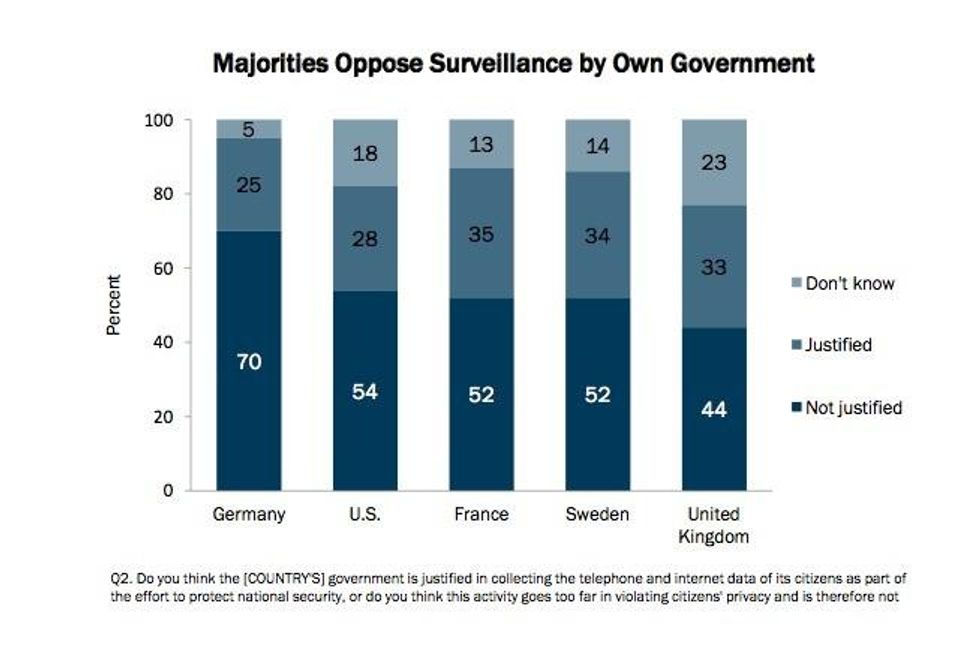US, EU Citizens Reject Unchecked Spying
As Snowden revelations continue, poll shows opposition to dragnet surveillance on both sides of the Atlantic

According to a survey, conducted by the U.S.-based think-tank the German Marshall Fund of the United States, far more citizens disapprove of the dragnet spying techniques of their governments than those that approve--with the most overwhelming figures coming from Germany.
In response to the question "Do you think the [own country] government is justified in collecting the telephone and internet data of its citizens as part of the effort to protect national security, or do you think this activity goes too far in violating citizens' privacy and is therefore not justified?" 70 percent of Germans said their government is not justified. Only twenty-five percent disagreed.
And, as Reuters reports, "Germans were even more hostile to governments collecting the telephone and internet data of people from allied countries, with 72 percent opposed and 20 percent in favor."
Meanwhile, 54 percent of those polled in the U.S. said the U.S. government should not spy on its own citizens. And 44 percent opposed spying on the citizens of allied countries with 33 percent saying it was justified.
Similar numbers came from the U.K.. Forty-four percent said their government's spying agency, the GCHQ, is not justified in spying on U.K. citizens, while 33 percent did not. Forty-three percent said their government shouldn't spy on allied citizens.
Similar results emerged from Sweden and France, where a majority polled in favor of curbing unchecked spying at home and around the world.
However, the U.S. shows no signs of slowing down its dragnet surveillance policies, despite ongoing domestic and international uproar. As the New York Times reported last week, after more than six months of NSA revelations showing the vast reach of the spying agency, "President Obama and his top advisers have concluded that there is no workable alternative to the bulk collection of huge quantities of 'metadata,' including records of all telephone calls made inside the United States."

_____________________
An Urgent Message From Our Co-Founder
Dear Common Dreams reader, The U.S. is on a fast track to authoritarianism like nothing I've ever seen. Meanwhile, corporate news outlets are utterly capitulating to Trump, twisting their coverage to avoid drawing his ire while lining up to stuff cash in his pockets. That's why I believe that Common Dreams is doing the best and most consequential reporting that we've ever done. Our small but mighty team is a progressive reporting powerhouse, covering the news every day that the corporate media never will. Our mission has always been simple: To inform. To inspire. And to ignite change for the common good. Now here's the key piece that I want all our readers to understand: None of this would be possible without your financial support. That's not just some fundraising cliche. It's the absolute and literal truth. We don't accept corporate advertising and never will. We don't have a paywall because we don't think people should be blocked from critical news based on their ability to pay. Everything we do is funded by the donations of readers like you. Will you donate now to help power the nonprofit, independent reporting of Common Dreams? Thank you for being a vital member of our community. Together, we can keep independent journalism alive when it’s needed most. - Craig Brown, Co-founder |
Jacob Chamberlain is a former staff writer for Common Dreams. He is the author of Migrant Justice in the Age of Removal. His website is www.jacobpchamberlain.com.

According to a survey, conducted by the U.S.-based think-tank the German Marshall Fund of the United States, far more citizens disapprove of the dragnet spying techniques of their governments than those that approve--with the most overwhelming figures coming from Germany.
In response to the question "Do you think the [own country] government is justified in collecting the telephone and internet data of its citizens as part of the effort to protect national security, or do you think this activity goes too far in violating citizens' privacy and is therefore not justified?" 70 percent of Germans said their government is not justified. Only twenty-five percent disagreed.
And, as Reuters reports, "Germans were even more hostile to governments collecting the telephone and internet data of people from allied countries, with 72 percent opposed and 20 percent in favor."
Meanwhile, 54 percent of those polled in the U.S. said the U.S. government should not spy on its own citizens. And 44 percent opposed spying on the citizens of allied countries with 33 percent saying it was justified.
Similar numbers came from the U.K.. Forty-four percent said their government's spying agency, the GCHQ, is not justified in spying on U.K. citizens, while 33 percent did not. Forty-three percent said their government shouldn't spy on allied citizens.
Similar results emerged from Sweden and France, where a majority polled in favor of curbing unchecked spying at home and around the world.
However, the U.S. shows no signs of slowing down its dragnet surveillance policies, despite ongoing domestic and international uproar. As the New York Times reported last week, after more than six months of NSA revelations showing the vast reach of the spying agency, "President Obama and his top advisers have concluded that there is no workable alternative to the bulk collection of huge quantities of 'metadata,' including records of all telephone calls made inside the United States."

_____________________
Jacob Chamberlain is a former staff writer for Common Dreams. He is the author of Migrant Justice in the Age of Removal. His website is www.jacobpchamberlain.com.

According to a survey, conducted by the U.S.-based think-tank the German Marshall Fund of the United States, far more citizens disapprove of the dragnet spying techniques of their governments than those that approve--with the most overwhelming figures coming from Germany.
In response to the question "Do you think the [own country] government is justified in collecting the telephone and internet data of its citizens as part of the effort to protect national security, or do you think this activity goes too far in violating citizens' privacy and is therefore not justified?" 70 percent of Germans said their government is not justified. Only twenty-five percent disagreed.
And, as Reuters reports, "Germans were even more hostile to governments collecting the telephone and internet data of people from allied countries, with 72 percent opposed and 20 percent in favor."
Meanwhile, 54 percent of those polled in the U.S. said the U.S. government should not spy on its own citizens. And 44 percent opposed spying on the citizens of allied countries with 33 percent saying it was justified.
Similar numbers came from the U.K.. Forty-four percent said their government's spying agency, the GCHQ, is not justified in spying on U.K. citizens, while 33 percent did not. Forty-three percent said their government shouldn't spy on allied citizens.
Similar results emerged from Sweden and France, where a majority polled in favor of curbing unchecked spying at home and around the world.
However, the U.S. shows no signs of slowing down its dragnet surveillance policies, despite ongoing domestic and international uproar. As the New York Times reported last week, after more than six months of NSA revelations showing the vast reach of the spying agency, "President Obama and his top advisers have concluded that there is no workable alternative to the bulk collection of huge quantities of 'metadata,' including records of all telephone calls made inside the United States."

_____________________

